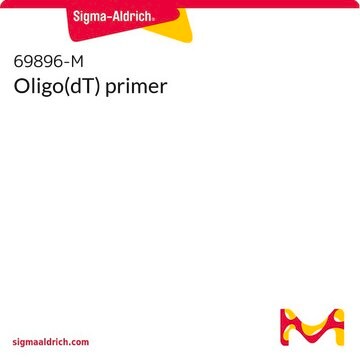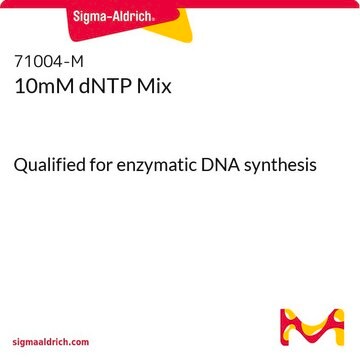Recommended Products
Other Notes
Hexanucleotide primers are a mixture of random 5′-hydroxyl hexanucleotides or hexamers, and can be used to quickly and efficiently prepare radioactive or non-radioactive probes using a DNA polymerase and a suitable DNA template.
Unit Definition
1 A260 unit = approx. 20 μg
Storage Class Code
11 - Combustible Solids
WGK
WGK 3
Flash Point(F)
Not applicable
Flash Point(C)
Not applicable
Personal Protective Equipment
dust mask type N95 (US), Eyeshields, Gloves
Certificates of Analysis (COA)
Search for Certificates of Analysis (COA) by entering the products Lot/Batch Number. Lot and Batch Numbers can be found on a product’s label following the words ‘Lot’ or ‘Batch’.
Already Own This Product?
Find documentation for the products that you have recently purchased in the Document Library.
Customers Also Viewed
Sambrook, J., et al.
Molecular Cloning: A Laboratory Manual, 10-10 (1989)
Methods for non-radioactive labeling of nucleic acids.
Kessler, C. et al.
Nonisotopic Probing, Blotting, and Sequencing, 51-54 (1995)
S Bauer et al.
The Journal of neuroscience : the official journal of the Society for Neuroscience, 23(5), 1792-1803 (2003-03-12)
The mammalian olfactory epithelium (OE) is composed of primary olfactory sensory neurons (OSNs) that are renewed throughout adulthood by local, restricted neuronal progenitor cells. The molecular signals that control this neurogenesis in vivo are unknown. Using olfactory bulb ablation (OBX)
Bernhard Reuss et al.
The Journal of neuroscience : the official journal of the Society for Neuroscience, 23(16), 6404-6412 (2003-07-25)
Multiple evidence suggests that fibroblast growth factors (FGFs), most prominently FGF-2, affect astroglial proliferation, maturation, and transition to a reactive phenotype in vitro, and after exogenous administration, in vivo. Whether this reflects a physiological role of endogenous FGF is unknown.
A P Feinberg et al.
Analytical biochemistry, 132(1), 6-13 (1983-07-01)
A technique for conveniently radiolabeling DNA restriction endonuclease fragments to high specific activity is described. DNA fragments are purified from agarose gels directly by ethanol precipitation and are then denatured and labeled with the large fragment of DNA polymerase I
Our team of scientists has experience in all areas of research including Life Science, Material Science, Chemical Synthesis, Chromatography, Analytical and many others.
Contact Technical Service














